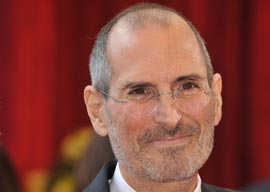
October 14, 2015

Steve Jobs
Source: Shutterstock
Yet, the German-Irish Fassbender doesn”t look like the German-Syrian Jobs. Oddly, director Danny Boyle doesn”t even have Fassbender dye his hair to match the young Jobs” famously shiny brunet locks. Perhaps this is due to the 2013 flop biopic Jobs, which starred Jobs” doppelgänger Ashton Kutcher, so Boyle went the opposite direction and didn”t try to have his leading man look at all like his character.
As charismatic as Fassbender is, he’s unable to bring out the hippie and Valley boy sides of Jobs. American actors are losing out on roles playing American icons like Jobs because they grow up “uptalking“ like Valley girls, with rising tones at the end of sentences, you know? In contrast, foreign actors learn to speak with an American accent by watching old stars with manly diction, such as John Wayne and Al Pacino.
But while Fassbender is one of the few contemporary stars who seems older than his years, Jobs was indeed boyish in affect. Perhaps this helps explain why so many people felt betrayed by him: They originally assumed Jobs was a goofy Ashton Kutcher, only to later discover he was an intense Michael Fassbender.
How accurate is Sorkin’s screenplay?
Sculley talked Apple’s board of directors into dumping the widely disliked Jobs in 1985. Jobs was not the kind of person to forgive and forget, so Sorkin’s scenes in which Sculley shows up at Jobs” 1988 launch of his NeXT start-up’s cubical computer and his triumphant 1998 return to Apple to launch the iMac are pure fiction. They”re what Sculley told Sorkin he wished he”d had a chance to say to Jobs.
Most of all, in the movie, the perfectionist Jobs spars with the two people in his life he can”t manipulate, who can”t be molded into the shiny future he envisions ruling over: his ex-girlfriend and their illegitimate daughter, Lisa. In Sorkin’s highly stylized but not unreasonable telling, his daughter’s mother seizes upon the product launches as vulnerable chokepoints at which she can wheedle a little more child support out of the stingy tech tycoon.
With paternal affection, Jobs had named his first attempt at a graphical interface computer, 1983’s $10,000 flop, the Lisa. But he then decided to deny paternity, despite a court-ordered blood test, and even claimed that Lisa stood for “Local Integrated Systems Architecture,” which, he admits later in the movie, doesn”t even make sense.
Sorkin is not the most psychologically expansive writer, but his one child is a girl, so he’s good at writing father-daughter scenes. He made up a daughter for Brad Pitt’s Billy Beane in Moneyball that added some touching human moments amidst the on-base percentages.
And in Steve Jobs, Sorkin’s notion of his daughter being the master marketer’s Achilles” heel isn”t all that contrived. I”ve been reading about Jobs since Apple’s initial public offering a month after Ronald Reagan was elected president in 1980 confirmed that the animal spirits of American entrepreneurs were back in action. Sorkin’s portrayal of Jobs as a jerk is controversial, but it rings true to everything I”ve read.
In particular, the entrepreneur’s bizarre mistreatment of little Lisa has been seen for 30 years or so as the Rosebud of Citizen Jobs. There’s nothing novel about Sorkin’s focus upon the self-inflicted fiasco of Jobs” relationship with Lisa. For example, Jobs” long-lost biological sister, the novelist Mona Simpson, used it as the plot of her 1996 roman à clef A Regular Guy. In her review in The New York Times, Michiko Kakutani wrote 19 years ago:
It quickly becomes clear to the reader that the title character of Mona Simpson’s new novel, “A Regular Guy,” is anything but a regular guy. Tom Owens is a fabulously rich, fabulously eccentric and fabulously self-absorbed entrepreneur…. He’s a bully who’s used to getting his way and used to discarding people and things…an emotional black hole.
That’s somewhat unfair to Jobs, who did get big things done, which is more than you can say about most people who are a pain to be around. (Here’s his sister’s lovely eulogy for him.) But considering how beatified he was at the time of his death in 2011, it’s worth remembering that Jobs was never some Aspergery nerd who didn”t understand the emotions of the people he abused. As Apple’s design chief Sir Jonathan Ive told Isaacson:
He’s a very, very sensitive guy. That’s one of the things that makes his antisocial behavior, his rudeness, so unconscionable…. Because of how very sensitive he is, he knows exactly how to efficiently and effectively hurt someone. And he does do that.